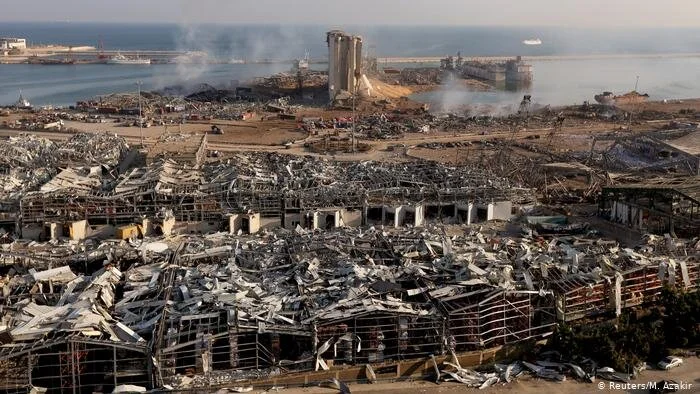The Devastated Beirut Port: One of the Nation’s Economic Pillars
Photo Reuters
On the 4th of August 2020, a catastrophic and cataclysmic chemical blast at the Port of Beirut made the whole world sit still, as apocalyptic images surfaced all over international and local media outlets. More than 171 people lost their lives, some were obliterated and others were buried under the heaps of concrete and debris. 6000 people were injured and thousands of buildings were damaged or laid to waste. In addition, to the crumbling economy and the worsening COVID-19 situation, things took to the worse, as around 300,000 Lebanese and foreigners residing in Beirut, lost their homes, livelihoods, and of course, their mental health. Indeed, the situation in Lebanon is very dire as politicians/ representatives of several sectarian factions are trading blames and accusations in an already-tense political environment.
The port of Beirut occupies a large area of 1.2 million m2, which contains four basins, 16 quays, and a container terminal that is capable of handling 1.1 million TEUs (shipping containers) per year. In 2018, Lebanon ranked 38th out of 171 countries with a score of 47.17 points in terms of UNCTAD Liner Shipping Connectivity Index. Regionally, Lebanon ranks in the sixth position. In 2017, it made 313 million USD in revenues and provided jobs for over 600 people. Moreover, it accounted for about 4 billion USD of the country’s GDP. On June 4, 2015, it was announced as the winner of the Gold Prize for the Information Technology Award for the best Port IT solution worldwide. In other words, the Port of Beirut has been worldwide recognized for the high quality of its Port Operations and Management Solutions. Despite all of this, the incident occurred, destroying any hope of a better tomorrow.
According to Beirut City Governor Marwan Abboud, the damages that the explosion inflicted alone on Beirut’s buildings and infrastructure will need 3-5 billion USD in repairs. Some other estimates, which included the damages of the port, amounted to 15 billion USD. Until today, tens of people remain missing and the real reason behind the incident remains a bit obscure. The most popular theory is the negligence and carelessness of the Lebanese government.
Since local administrations have failed in providing for ordinary citizens, it is up to us, as a church community to step in and aid the people of Beirut during this dark time. We must not only provide them with traditional emergency aid but also seek to build their economic resilience to achieve viable sustainability. As such, it is up to us to respond in accordance to the actual needs of the people while being innovative, daring, and tenacious.
We call upon all our partners, to aid us in delivering swift assistance to those grossly affected by the blast. It is the time to band together under one banner “The Love of Jesus Christ” and spread his word through action.

